In this blog post, we will talk about what Salesforce (SFDC) and Salesforce Career options are available in the Salesforce ecosystem. We will see different career choices you have or different job profiles that are available in the Salesforce job market. Also, we will cover which Salesforce Career Paths we can take to grow in the Salesforce ecosystem. Let’s start our Salesforce careers guide.
What is Salesforce(SFDC)?
SFDC stands for Salesforce dot com or Salesforce.com. Salesforce is one of the most popular and influential Cloud-based CRM systems. Over the years it has evolved and grown into “THE GO-TO…” option for every small, medium, and large-scale industry.
Sales, Service, Field Service, Mobile, Marketing, Net Zero, Non-profit, Education, Philanthropy, Commerce and CPQ. Just name it, and they have an OOTB cloud solution in place for immediate deployment – you just have to configure and customize it as per your industry and customer needs.
Let’s dive deep into the various career options and opportunities in this vast ecosystem. If you a new to and Fresher, then check How to get a job in Salesforce as a Fresher post to learn about the recruiting process.
Career options in Salesforce
To give a quick perspective of various roles and responsibilities in any Salesforce project/program team. Let’s have a look at the below diagram. This is a sample waterfall delivery-based model to showcase various technical and functional roles in a salesforce program.
Side Note- Waterfall delivery is a methodology- where each stage like requirement gathering, design, development, and testing, is a milestone, and a complete set of requirements for the whole program/project gets delivered as a single entity. We can talk about different methodologies in some other blogs.
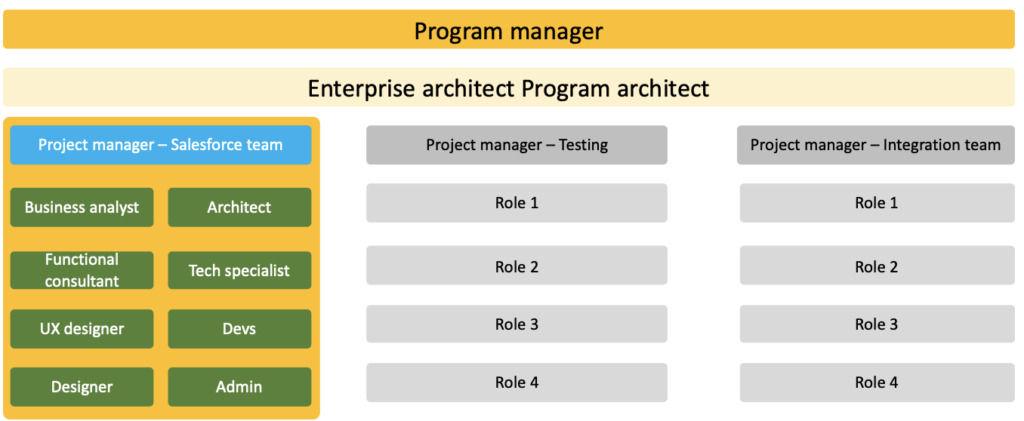
Let’s talk about all the different Salesforce career options and equal opportunity in detail.
1. Salesforce Administrator
As a Salesforce Administrator / Admin, you hold a very important responsibility to correctly set up the Customer Org, their roles/ responsibilities, and Hierarchy in the system. You also set up which login user should see what kind of data- controlling the visibility of the screens, etc. Setting up OAuth, managing and setting up dashboarding, reporting, and any outbound/inbound communication channel setups, etc.
These days, we also see “DevOps” as a separate role for most of the programs where the DevOps person/team is responsible for managing and setting up the process for deploying data into higher environments, check-in checkouts of different teams, and moving the packages to higher environments like Integration environments (CIT, SIT), UAT, Pre Prod and Production.
Average salary (national): $ 95,000. Check a Salesforce admin guide to the role, salary, and how to earn more.
Salesforce Administrator Career Path
Here is a suggested path for newcomers, but your journey can differ based on experience and opportunity.
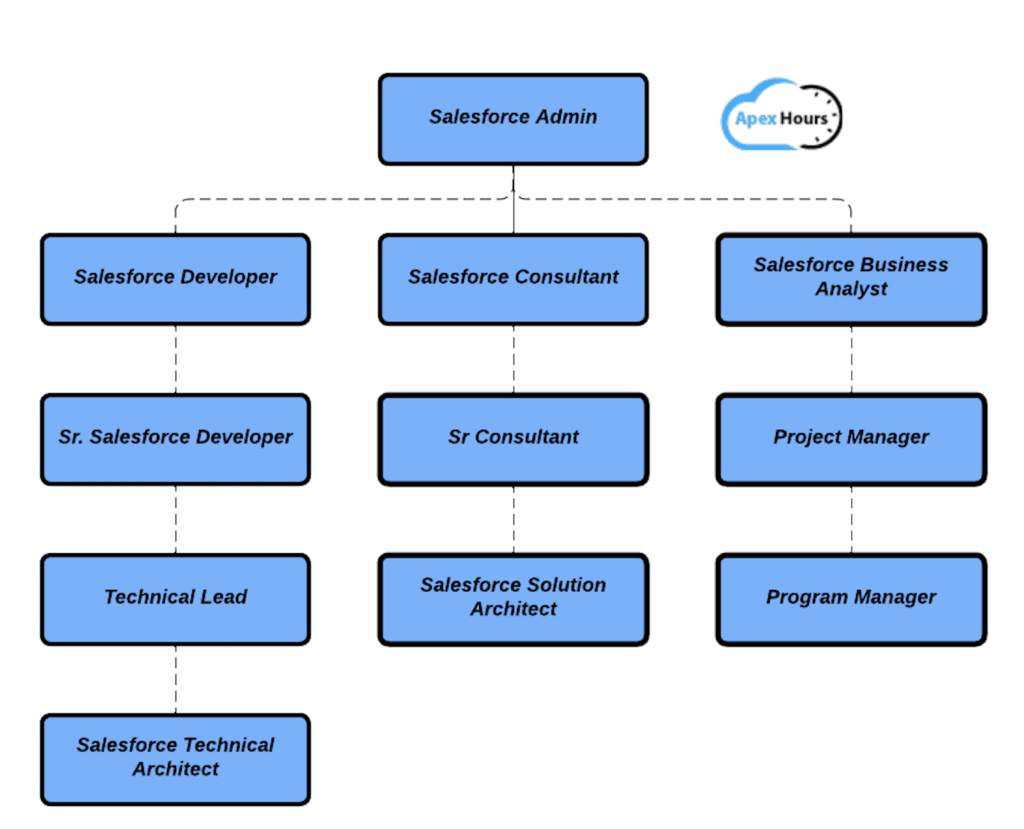
2. Salesforce Developer
As a Salesforce Developer, you are expected to be able to configure as well as customize the application to suit the customer requirements using Apex, flow, triggers, OOTB setups, process builder, LWCs, etc. Salesforce Developer is one of the most demanding skills in Salesforce industries. A Salesforce Developer is a programmer who builds Salesforce Applications on various PAAS platforms.
Average salary (national): $125,000
Check How to become a Salesforce Developer and the hiring process to get a job in the Salesforce ecosystem.
Salesforce Developer Career Path
Here is a suggested path for a new Salesforce Developer, but your journey can differ based on your experience and opportunity.
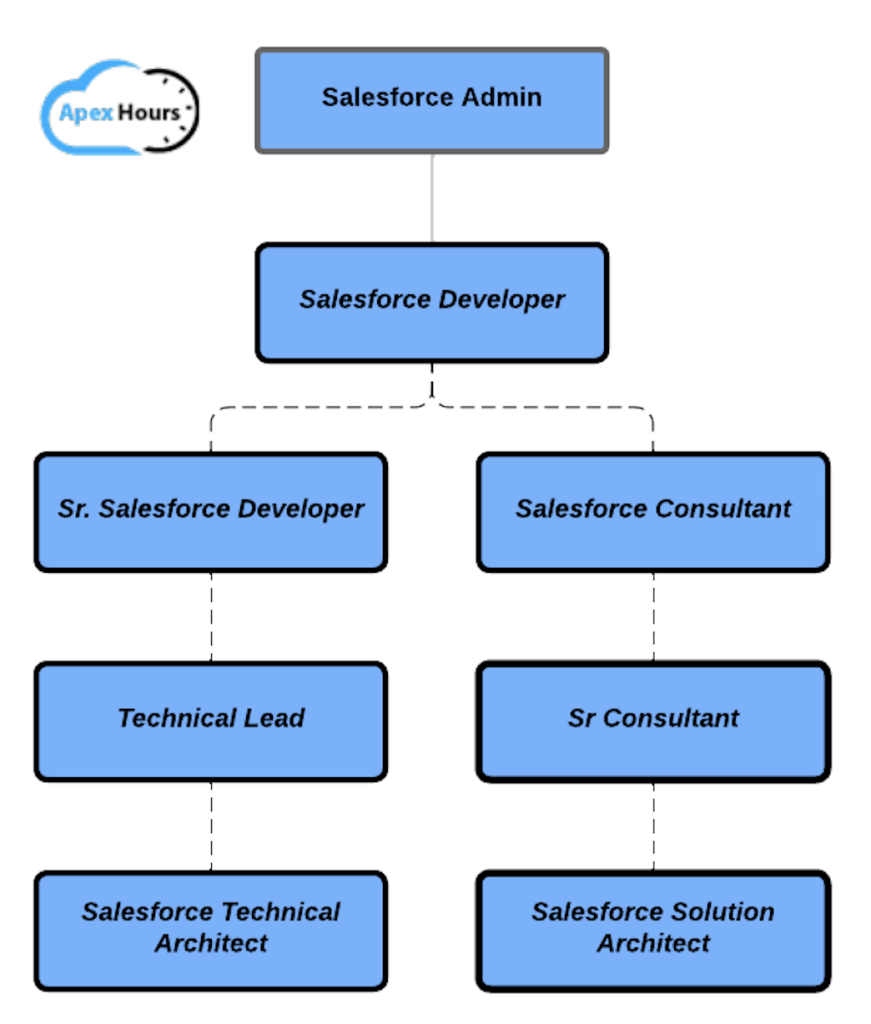
3. Functional Consultant
Being a consultant means having a “Know How” of the system. Not just following what’s required to be done- but also being able to suggest the processes that are industry best practices. A Salesforce functional consultant is responsible for creating a Functional Design Document for the whole set of requirements for the Salesforce team and being able to suggest process improvements based on Salesforce Best Practices. Check here to learn about 5 Skills Great Salesforce Consultants Have In Common.
4. Tech Specialist
To support the best practices suggested on a process level- we need to have a deeper understanding of how the technology works, and that is where the Tech Specialist plays an important role. Someone could be managing an expert at the Integration area, someone is excellent at LWCs, someone is handling the CPQ EPC (product catalog side of things), etc.- these are just a few examples of technical specialization roles in Salesforce.
5. Business Analyst
Right from the requirement capture, running customer workshops, requirement elicitation, interacting with different customer user groups, creating the business requirement document (BRD), and capturing the as-is and to-be processes- this all is taken care of by a Business Analyst(BA). Check here for the Top 7 Skills in a Salesforce Business Analyst checklist.
Average salary (national): $104,000
6. Salesforce Architect
To stitch through all the requirements across the project and to be able to suggest the best approach for all the set of requirements, an Architect plays a pivotal role. Salesforce Architect is responsible for gathering technical and functional details from each of the track tech specialists, BAs and available consultants to be able to come up with the overall approach of how the requirements will be technically designed and delivered. For any technical blockers- they are the key people on the program.
Average salary (national): $150,000
Check how to Become a Salesforce Certified Technical Architect (CTA).
7. Designer
Similar to the functional consultant role- Designers work across the streams and systems and have a more considerable additional responsibility to see how Salesforce would fit in the overall program ecosystem. They would come up with the overall program-level design. This functional design covers the whole program, including interacting systems, inbound and outbound communications, APIs, user interaction flows, and how all the technologies/platforms fit together in the program.
Average salary (national): $112,000
8. UX Designer
The Salesforce UX designer is the one who comes up with the right way of representing customer requirements on the Salesforce screens. It’s not just about the UI design (how the screen looks and just developing those) but being able to bring in and enhance the customer experience in the system by conducting user interviews, creating system and flow mockups, screen designs, understanding current system usage challenges and bring improvements and coming up with the best experience for your customer.
9. Project Manager
In a traditional project delivery methodology (Waterfall, as explained earlier), a Project Manager is responsible for managing all these above roles deliverables, creating an overall delivery plan, managing project risks, challenges, resourcing, etc.
In the agile world (where requirements are split in smaller chunks and delivered) the project manager role is typically replaced by a Product Owner/ Product Manager.
Average salary (national): $90,275
10. Enterprise Architect/ Program Architect
Enterprise Architect/ Program Architect plays a crucial role on very high-scale implementations and is responsible for any/every interacting systems’ technical and business design.
An enterprise architect works with the representatives (PMs/Architects) from each platform/team (including salesforce teams) and even with the customer stakeholders/business users to understand their requirements and challenges and to see the feasibility and compatibility of the underlying systems and requirements.
11. Program Manager
A program manager sits on the top of this hierarchy. This role cuts across all the teams, similar to Enterprise Architect/Program Architect but is responsible for managing the customer teams, vendor teams, delivery teams, testing teams, etc. on an overall program delivery level.
Managing the program schedules, milestones, and delivery across the teams to adhere to the program goal- the program manager is responsible for this e2e. Managing customer stakeholder interactions, reporting to the steering committee and program sponsors, and controlling program risks, budgets, etc.
12. Salesforce Release Manager
The role of a Salesforce Release Manager is crucial in ensuring the smooth and efficient delivery of Salesforce solutions within an organization. The Salesforce Release Manager is a professional responsible for overseeing the planning, coordination, and execution of Salesforce releases within an organization. Learn more about Salesforce Release Manager Roles & Responsibilities.
Check the Average Salesforce Salary Guide.
Salesforce Career and Salesforce Job Market
Salesforce career paths that you can follow
How can you know which career path is right for you? Based on the above insights into the different roles, it’s up to your expertise and interest to get into the groove and start picking the roles for your upcoming assignments. If the functional side interests you more- then go for BA, Functional Consultant, and Designer roles.
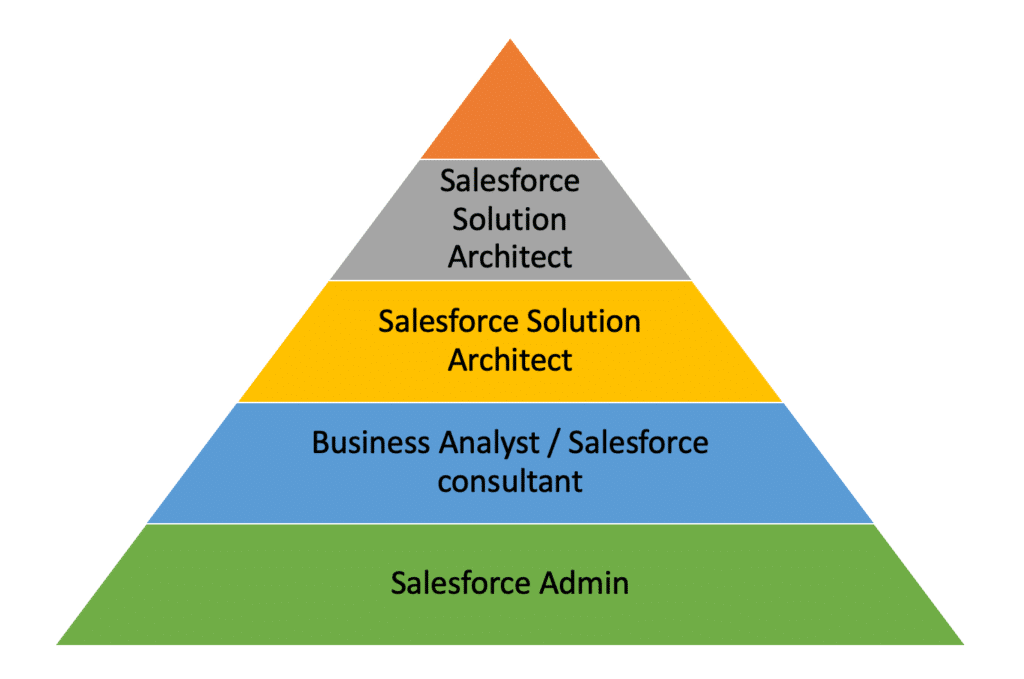
The technical side is your arena, and if you love to code, Tech Specialist or architect is the right role for you.
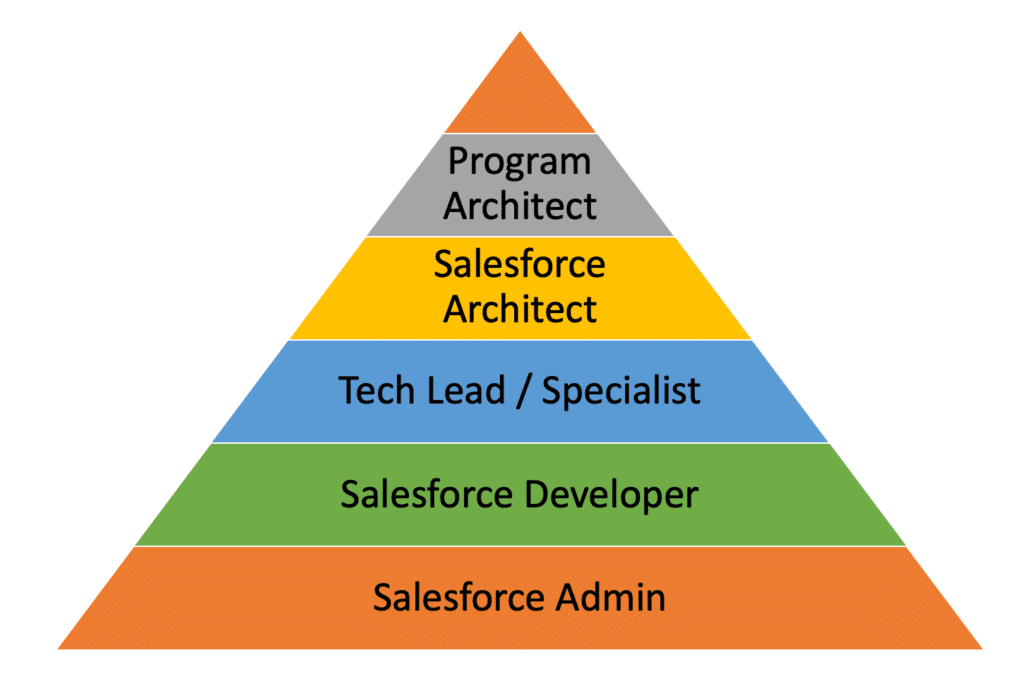
You can also check Salesforce Management. If you want to follow the Salesforce Management path then flow below the path.
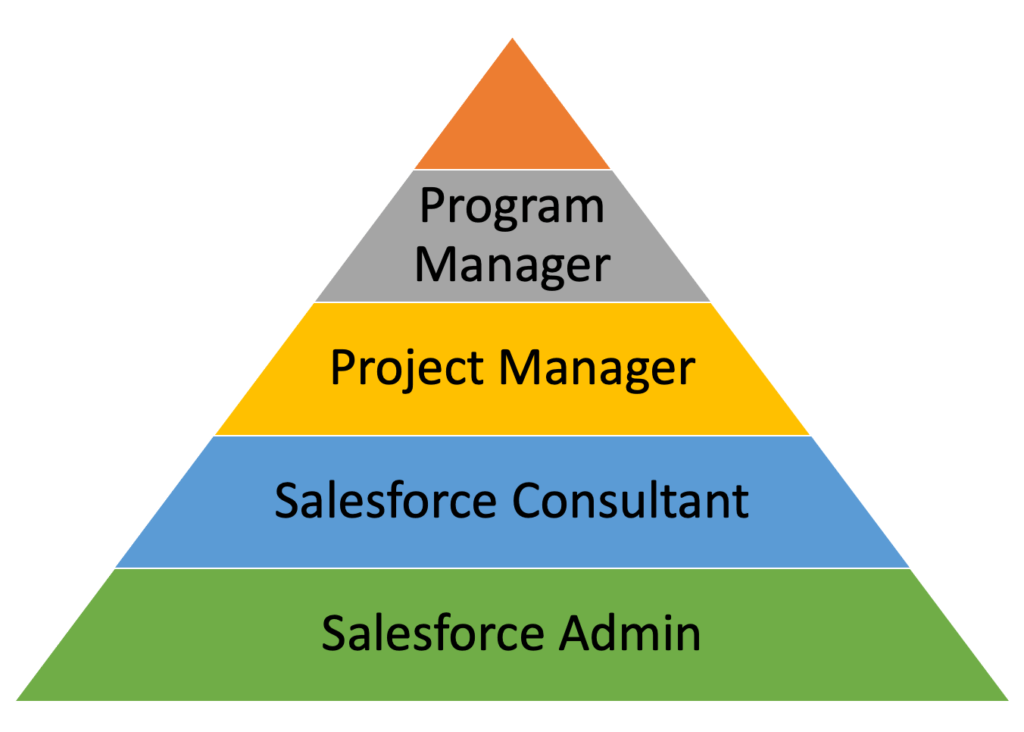
How to get started in Salesforce
There are standard as well as advanced trailhead courses for Admin, Developer, CPQ, Field Service, etc. Additionally, you also have Trailmixes which are customized learning paths by people in the salesforce ecosystem (called Trailblazers) – that give you real-time and a piece of hands-on knowledge with short exercises/ projects to grow your skill.
1. Trailhead
The only thing you need to get started in Salesforce is to register yourself on “Trailhead” and get started for free! Sign up for a new account, and voila! You have many ways to begin exploring any topic/role you want to grow in- search of what you want.
Trailhead quests are a fantastic way to earn some great Salesforce goodies to keep yourself motivated and updated. You can also help in the community by answering questions from fellow trailblazers, participating in the challenges, and getting rewarded!
Learn more about Salesforce Trailhead and the Salesforce community.
2. Salesforce Community
Also, make sure to associate with your local Salesforce Community group- you can join the group under the “Community” tab on the site. These communities host multiple events and talks to get you up to speed on the technical and functional topics, any new trending topics, updates, new releases, platforms, etc.
Learn more about Salesforce community events.
3. Certifications
Certifications are another vital milestone to prove your hands-on expertise- both in the community as well as for your customers. If your organization is a Salesforce Partner- you have an additional set of Partner learning resources available at your disposal- Partner Learning Camp!
Check out the list of all Salesforce certifications list and costs.
4. Partner Portal
It has partner launch event webinars, detailed additional topics shared exclusively for partners, and so on. There are specialized credentials introduced for partners too- Accredited Professional certifications.
5. Apex Hours
Apex Hours is a stop platform to learn Salesforce skills and technology. It has all the tutorials you need to start with Salesforce.com and become a master in it.
Where to learn Salesforce for free
Start learning Salesforce from Trailhead, and if you like recording, then check the Apex Hours YouTube channel. Check our Free Salesforce Training Series for different topics.
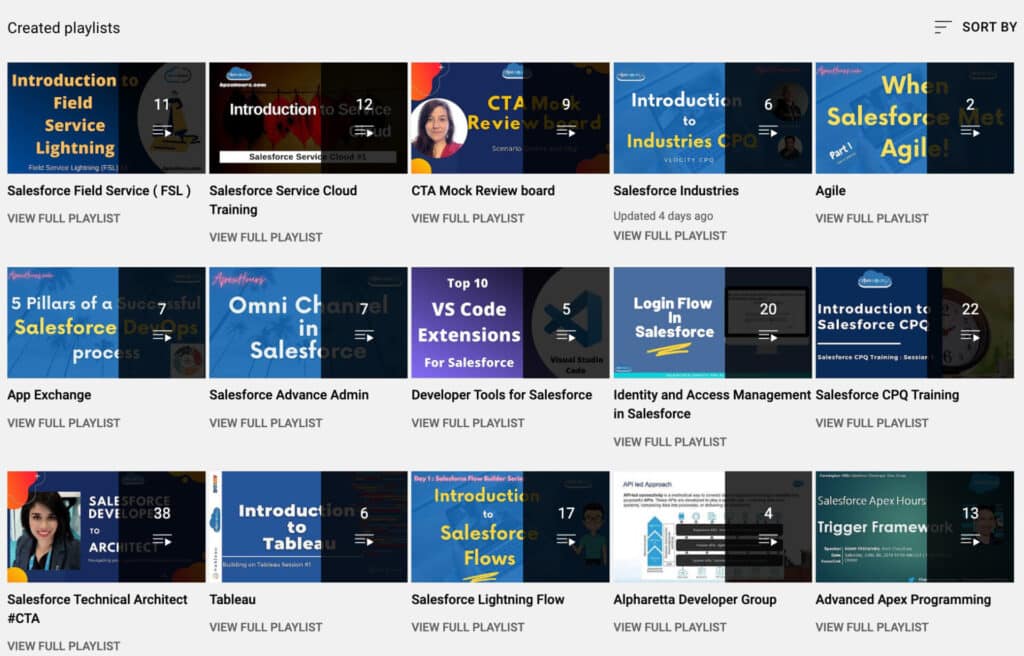
How to get a job in Salesforce as a Fresher
Salesforce careers FAQ’s
Yes, Salesforce careers are in high demand in the current eco-system and have high-paid salary jobs. We have different career choices or job profiles available in the Salesforce job market.
The Salesforce ecosystem is a relatively stable career. We also need to understand that none of the careers is recession Proof.
There are different career options available in Salesforce. You can start the Admin skill and then move to code to become a Salesforce Developer.
You love to code, or you like to analyze business requirements. Salesforce has a role and a place for you in the Salesforce ecosystem.
What Next
Check the post below to learn more about your career path.
Summary
All in all, there are ways and means you can top your game with Salesforce! Just dive into it. It is time to start your journey to a Salesforce career. Start learning Salesforce from Trailhead and Apex hours.

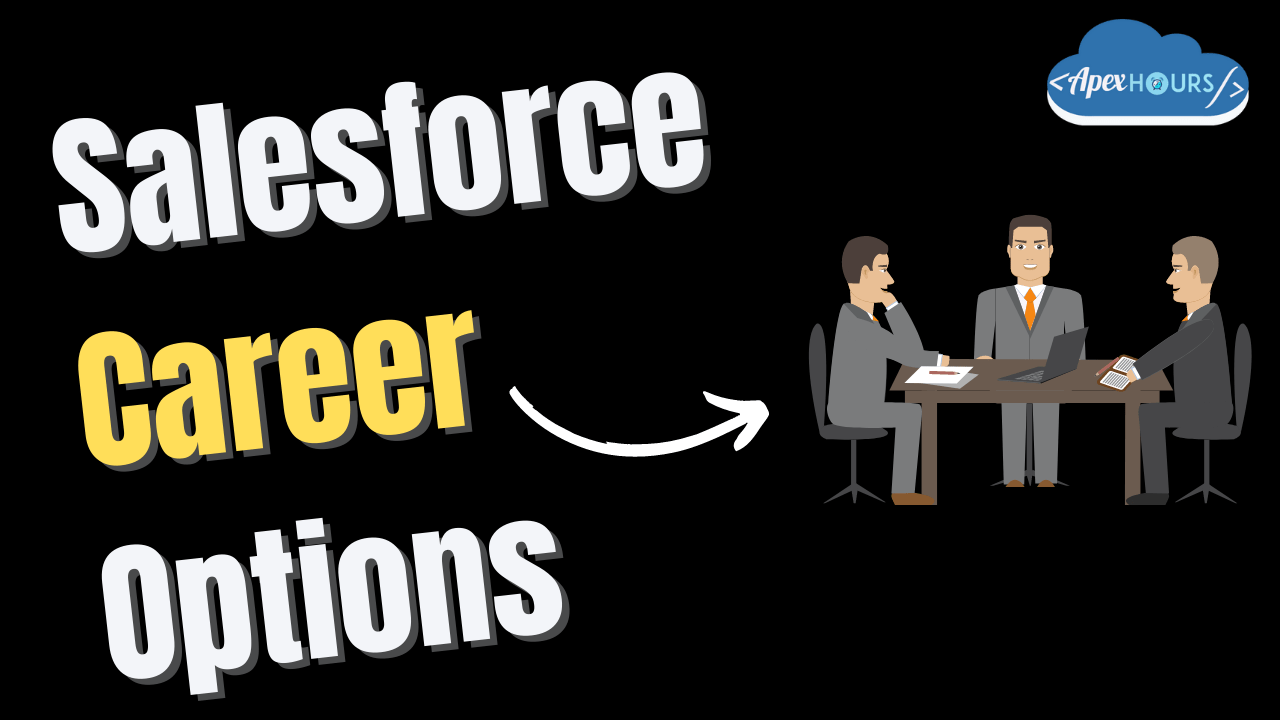





Hello,
Thank you for sharing. In fact, I got the Admin cert last Sept. My nature is more operational than technical and my goal is to be in an operational or managerial role in Salesforce. I am looking for a Junior role to give me such an experience.
All the best for your Salesforce journey. You can follow Salesforce consult career path.
Hi Team, I am working as Salesforce admin and I would like to change the role to different organization. Please guide me to my career growth to next level.
If you like code then I would highly recommend you to learn Salesforce Development for better future growth.
I would like start Salesforce admin.i had completed my (bsc )statistics.
All the best for your Salesforce Admin Preparation. You can check our FREE Training https://www.apexhours.com/salesforce-admin-training-free/ . I hope this will help you
Hello, I am working as a UI developer, I have total 7 years of experience in this field, I want to change my career to Salesforce plot form, what are the opportunities I have? And how and where can I learn Salesforce, please help me on this.
If you have UI Developer then I would be suggest you to learn LWC. Check Trailhead for more content.
Hello, I want to start my career in Salesforce ecosystem.
I want to know about Salesforce marketing cloud.What do you think about growth in SFMC..
Cloud Technical specialization in demand skill in Salesforce. I would highly recommend you SFMC skill or CPQ skill.
Very very useful information with all career paths in a nutshell in salesforce.
thanks glad it helped
Hi , Thank you for this post, this is very helpful for newbee’s who are entering into salesforce ecosystem like me. I have 8 Yrs of manual QA experience and I’m planning to take my salesforce admin cert. I’m not much expertise into coding, but I’m inclined more on the technical side. can you please suggest me what would be the role I can choose in salesforce. Thank you.
.
You can prepare for Salesforce Admin Certification .https://www.apexhours.com/salesforce-admin-certification/. Check how to become a Salesforce Developer https://www.apexhours.com/how-to-become-a-salesforce-developer/
Hi,
I am learning Salesforce admin and development and have to start my career ASAP.please guide me. As I am 2017 passed out,I didn’t get enough calls
Check How to get a job in Salesforce as a Fresher post https://www.apexhours.com/how-to-get-a-job-in-salesforce-as-a-fresher/
I want to start my career in Salesforce
All the best for your salesforce career
I have started learning SF Admin course from Apex Hours and passed my Admin certification. I would like to say a big thank you and all the team for explaining in detail with practical scenarios.
Thanks for your kind words
Hi,
I have 20 years of Automobile industry experience in 3 D surfacing which is quite technical and one of the niche skill in Automobile industry. But I have lost job due to all car industries moving out of Australia.
Now I want to get into IT. Can you please recommend where can I start with Salesforce. Appreciate your response.
Thanks
I have total 6 yrs of experience in AEM as a CMS. I want to change my career from AEM to salesforce as I dnt have interest in development. Can you help me what should I choose as no-coding platform in salesforce
good
Good
Good.
good